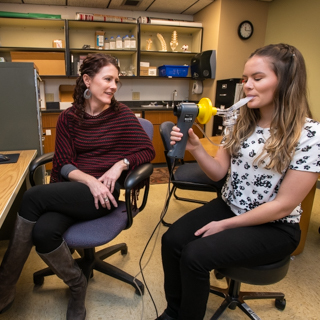Tips for Communicating
Tips for Communicating with Someone with Aphasia
(Source: National Aphasia Association).
Each individual with aphasia has unique skills and abilities. The following communication tips may be more helpful for some individuals than others, but are likely to help reduce frustration and increase communication success.
- Make sure you have the person's attention before communicating.
- During conversation, minimize or eliminate background noise (such as television, radio, and other people) as much as possible.
- Keep communication simple but at an adult level. Simplify your own sentence structure and reduce your own rate of speech. You don't need to speak louder than normal but do emphasize key words. Don't talk down to the person with aphasia.
- Encourage and use other models of communication (writing, drawing, yes/no responses, choices, gestures, eye contact, facial expressions) in addition to speech.
- Give the person time to talk and let them have a reasonable amount of time to respond. Avoid speaking for the person with aphasia except when necessary and ask permission before doing so.
- Praise all attempts to speak; make speaking a pleasant experience and provide stimulating conversation. Downplay errors and avoid frequent criticisms/corrections. Avoid insisting that each word be produced perfectly.
- Augment speech with gesture and visual aids whenever possible. Repeat a statement when necessary.
- Encourage them to be as independent as possible. Avoid being overprotective.
- Whenever possible, continue normal activities (such as dinner with family, hosting company, going out, etc.). Do not shield people with aphasia from family or friends or ignore them in a group conversation. Rather, try to involve them in family decision-making as much as possible. Keep them informed of events but avoid burdening them with day to day details.
Tips for Caregivers
- Caregiving is a job and respite is a caregiver's earned right. Reward yourself with respite breaks often and do not feel guilty about giving yourself a break.
- Wat out for signs of depression, and don't delay in getting professional help when you need it.
- Be certain to take care of your physical, mental, and emotional health. Exercise, eat healthy foods, make time for leisure, and connect with family and friends.
- When people offer to help, accept the offer and suggest specific things that they can do.
- Be an advocate - educate yourself about your loved one's condition and how to communicate effectively with doctors.
- Observe and participate in therapy, as much as is comfortable for you and your loved one.
- There is a difference between caring and doing. Be open to technologies and ideas that promote your loved one's independence.
- Grieve for your losses, and then allow yourself to dream new dreams.
- Seek support from other caregivers. There is great strength in knowing you are not alone.
- Find a support group on the Aphasia community groups section.
- Stand up for your rights as a caregiver and citizen
- Be positive---Have HOPE!
